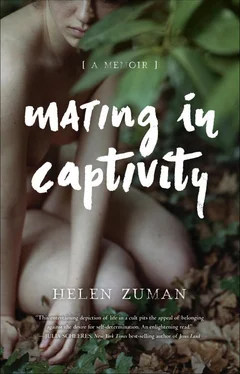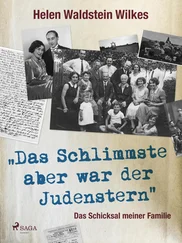I didn’t want to see The Matrix . Watching it in a theater the previous September, a month before I’d come to Zendik, I’d been terrified by the kinship I’d felt with the fetuses hooked to the grid. I, too, was trapped—in a war machine wired to suck my eight hours a day, my debt and tax payments, my numbed acquiescence. But by March 2000, the story no longer gripped me. Hadn’t I escaped the matrix?
Plus, I disapproved of Zendiks’ occasional indulgence in “square” movies—to me, tentacles of the Deathculture. Two years later, when the entire Farm would troop off to a local movie house to see The Fellowship of the Ring , I would object and stay home, vainly hoping to enjoy my couple hours alone.
I stayed up till 5:00 a.m. that morning after Mardi Gras, not to see Neo through to freedom, but to savor the warmth of belonging. Wulf rose from the page to whisper in blessing: Yes, the kingdom of heaven is at hand. It’s here on this beautiful earth.
The next weekend, no one sold. On Saturday afternoon, word filtered down from the Addition to the Farmhouse—from the purples through the grays to the blues, browns, and greens—that we would celebrate our success with a dinner party.
That evening, released by postselling quarantine from serving and cleanup, I sat kitty-corner from Kro at one of the half-dozen folding tables arrayed on the widest of the terraces climbing to the Addition. We’d picked and shoveled these levels, then walled them with stones hauled by pickup truck from a nearby creek and heaved off the tailgate to be puzzled into place. Soon Arol would muster labor to beautify the hillside with a pergola, and flower gardens she’d design. For now, sprigs of wild violet garnished the tables, draped in bedsheets shading from lavender to midnight. Though I wore only a light dress and jacket and it was still winter, I didn’t shiver. Kro’s heat, the red wine, pride in my share of our triumph, kept me warm. His grin while we drank grew broader and sweeter. His eyebrows rose in sly peaks. As laughter lilted around us, his hand crept from my knee to my thigh to my waist. The embraces of lover and tribe entwined to hold me in what could have been an infinity sign.
[ chapter 5 ]
Last Glimpse of Sunlight
SITTING WITH MY MOTHER at her kitchen table in Brooklyn, I insisted on delivering my version of what had happened in the five months since I’d left her for Zendik.
I needed her to know she was wrong: I hadn’t dropped into a work camp with no use for my talents, and I wasn’t going through a phase. Zendik was so much more than a bunch of hippies shitting in the woods and a newsprint booklet she didn’t see as art. It was the one place on Earth where, in Wulf’s words, “children can really love their parents, boys can really love girls, women can really love men.”
She had to find Zendik worthy and believe I would stay. Otherwise I might be forced to face my closed bank account, my shrunken horizon, the doubts I’d pounded down about the commitment I’d made.
“I just want you to understand why I’m at Zendik,” I said.
I was not on a selling trip. I’d taken the bus to New York alone, for a long weekend, with money my mother had sent me. I’d gone on an “out.”
As a young Zendik, I was free to leave the Farm for a few days—or weeks, or months—without backlash. Either I’d succumb to my old story—proving I’d never been battle-worthy—or return to the Farm hot for combat. Older Zendiks, on the other hand, paid for the breaks they took. As tenure lengthened, leaving turned to betrayal.
I’d arranged this out because, in the month since Mardi Gras, I’d lost heart. Gone dull. And stayed that way, despite a litany of stratagems devised to revive myself:
I hiked up the mountain to sing, hoping for a chance to sing with the band.
I got Swan’s permission to join her dance class.
I practiced walking on a pair of stilts a carpenter built me.
I did backbends in lull moments and somersaulted down slopes.
I had dates with a few new men, seeking one as attentive as Kro, as charged as Estero.
I strung one hundred lengths of fishing line across the door frame of the little room in the barn loft, to feel the sting of a hundred threads snapping against my legs and chest.
I lay on the floor of the loft with fifty-pound discs on my heart and gut—testing, when I lifted them, for hints of levitation.
I hauled a fifty-pound grain sack up and down the hill from the barn on my shoulders, for the thrill of lightness I felt when I dropped the weight.
I doodled in pebbles on the cave floor while a boulder rolled in to seal it closed.
I traveled to Brooklyn for assurance that love as I desired it did not exist beyond the cave.
If I stood at the kitchen window and squinted, I could see the Statue of Liberty, lifting her lamp above the harbor. Sitting at the table, I faced away from her.
“I never told you this,” I continued, glancing from my mother to the jars of beans and grains on the shelves at her shoulder, “but when I was in college, I hooked up with guys I met on the road a couple times, and I felt like I had to keep that stuff secret from just about everyone, especially you.”
She held my gaze, chair angled toward me. She’d converted to Catholicism in her forties. Neither her 1950s upbringing nor her adopted religion had equipped her to speak frankly about sex, or even brief me, when I was a teenager, on the apocryphal birds and bees. This was the kind of conversation we didn’t have in my family. Yet we were having it.
“At Zendik it’s different. Sex is part of life. We all talk about it, right out in the open. No one has to be ashamed or keep secrets. I feel like I can finally show I’m a sexual person.” I was tearing up now. “And that’s really important to me.”
Once, I’d seen my mother kiss my father. Once, I’d surprised them in bed together. Mostly she slept in the guest room and kept to the kitchen and dining room, while he sequestered himself in a large parlor divided by a curtain into sleeping and work spaces. In that apartment—larger than the one she lived in now—a long hall separated her domain from his.
In the summer of 1999—shortly before I moved to Zendik, and seven years after my parents’ divorce—my mother asked me to write a statement in support of her request for an annulment from the Catholic Church. Divorce dissolves a union. Annulment decrees it never happened.
In my statement, I set down for the first time an image I’d long associated with my parents’ marriage: two ladder shafts, standing parallel, joined by few, if any, rungs.
Maybe, in breaking with my mother’s reticence, I hoped to shake her example and gain a chance at loving partnership with a man.
I could tell by the way she pressed her lips together that she was both bewildered by my outburst and working to absorb it. Behind her, morning sun seeped down the hallway from the living room. She pressed her hand, palm down, onto the table. “You be Jesus,” she said. “I’ll be John the Baptist. Do what you’re called to do. I don’t need to know your reasons.”
John the Baptist had prepared the way for a messiah, blind to the storm his coming would stir. She would stand behind me through my journey, despite the nightmares it would bring her. She spoke with respect, and surrender.
But my hanging judge heard something else: proof that she was, as charged, too prudish to mother me through womanhood. Arol alone, with her lush mane and young lover, could fill that role.
Soon after I returned to the Farm, I wrote my mother a poem I would not have dreamed of showing her. In it, I divided myself from her, my lovers from her ex-husband: “Listen, mother—/ I am not your daughter/ I am fucked by strong men/ Your man had brittle bones/ A leg of stones/ And no love to give you then.” Also, I offered hope. Maybe if I could form a loving helix with a man, I could someday guide her past her years in bitter parallel: “Listen, mother—/ I will find another/ Way to be with men/ I’ll have less alone inside my bones—/ And love to give you then.”
Читать дальше











